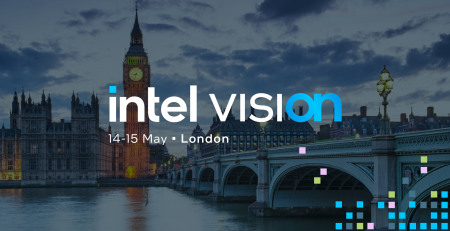Intel® Vision 2024 London: AI Today, Tomorrow and for the Future
Written by Kieran Gilmurray and sponsored by Intel®
After spending two incredible days at Intel® Vision 2024, one thing is clear: the future of everything involves AI. Intel® showcased incredible AI technology integrated across every aspect of our lives, from edge computing and chip manufacturing advancements to interactive, immersive experiences at sporting events and AI in every device.
Intel® Vision 2024 had something for everyone. This two-day AI tech extravaganza was an extraordinary mix of keynote speeches, demos, special guests and hands-on experiences. So, what grabbed my attention? Well, it was an Intel® Vision 2024 event, so a lot of things! But let me pick four personal highlights from this two-day wonder fest.
My four key highlights from Intel® Vision 2024.
1. Intel® Vision 2024 showcased real-world AI applications—not future promises of never-to-be-fulfilled real-world impact. The event moved beyond theoretical discussions, with Intel® demonstrating real, live, working AI technologies that address real-world business problems and opportunities.

Sodaclick: Powering Content and AI Experiences
AI represents a paradigm shift in how humans and technology interact and how businesses and people will operate in the future. Witnessing case study after case study across many different industries demonstrated an exciting reality: AI isn’t some futuristic concept – it’s a tool that can actively improve efficiency, unlock insights, and drive innovation across sectors today.
AI models can propel enterprises and people towards greater efficiency, quality, and productivity, and Intel® is making AI work!
2. Responsible AI: Innovating at the Speed of Trust and Compliance
If we are to ask people to put faith in Large Language Models (LLMs), businesses must mitigate their risks, e.g., AI bias, hallucinations, etc. A recent survey by Intel® revealed that just under one-third of respondents have concerns regarding the ethical and responsible implementation of LLMs. Without a solid foundation in compliance and privacy, enterprises will have a tough time integrating LLMs into their business as customers and staff simply won’t trust them. In other words, enterprises must adopt ethical and responsible AI practices when deploying AI.

The breakout session on responsible AI – “How the Evolving AI Policy Landscape Will Affect Your Business” was excellent. Enabling ethical and responsible AI requires a comprehensive approach to processes, systems, data, and algorithms, with people at the core.
It was reassuring to see that Intel® is stepping up to the plate by building AI infrastructure with efficient risk management systems in place. This will give enterprises and people the confidence to trust models so they can reap the huge rewards from using them.
3. Boosting GenAI with Intel® AI Solutions today!
Over the last two years, the exponential growth of GenAI models has paved the way for hyper-efficient content creation, from text to images to voice to video.
However, the limitations of traditional generative models have hindered their full potential. Insufficient control over generated outputs, hallucinations, and a lack of context or awareness often account for a less-than-desirable customer experience.
Is there a way around it?
With Intel® AI Solutions Today, of course, there is a way. At the ‘Fire-up Your Generative AI with RAG’ breakout session, I learned about Intel®‘s two-fold approach to solving these problems.

The first solution is the adoption of Retrieval Augmented Generation (RAG), a method for grounding AI language models in external knowledge sources to improve the quality of the outputs. This helps ensure that the AI’s output is both factually accurate and contextually relevant.
Second, Intel® is steadily equipping enterprises with AI-ready hardware. Last year, Intel launched the 5th generation of Intel® Xeon® processors and Intel® Core™ Ultra Processors designed specifically for AI workloads.
This year, they launched the Intel® Gaudi® 3 AI Accelerator. The Gaudi® 3 AI Accelerator offers a significant leap in performance and productivity for AI training and inference on popular large language and multimodal models.
By combining the capabilities of Xeon and Gaudi, enterprises can accelerate AI workflows, including RAG, leading to solutions that enhance the accuracy and quality of Gen AI outputs. That can only be a good thing.
4. Enhancing Olympic and Paralympic Games with AI
This was perhaps my favourite takeaway from this fantastic event. Not only did I get a glimpse of how Intel® is integrating intelligence into many facets of the Olympic and Paralympic Games, but I also got a chance to speak to Olympic athletes who will participate in the games!

During my conversation with Molly Caudrey and Helen Glover, I learned how AI technology can track and analyse athletes training data to improve their performance and chances of Olympic Games success. Every centimetre or percentage improvement AI delivers gives them an advantage over other athletes and that matters when the margins between winning and losing are so narrow at the games.
The nerd in me was amazed to learn about digital twinning. In case you are wondering what that is, it is the process of generating virtual replicas of places that aim to make planning and organising events easier.
Digital twins will help event organisers better position broadcasting cameras and screens to help with pre-event venue preparation. By creating virtual replicas of venues, they also enable the opportunity for virtual visits and training. This will optimise venue operations and minimise unnecessary travel to event sites, thereby reducing the carbon footprint of the 2024 Paris Games.

What hardware is being used? The answer is Intel® Xeon® Scalable processors and Intel® ARC™ A770 GPUs are the powerhouses that are making this possible.

Beyond Innovation: Shaping the AI Future with Intel Vision
As I departed from Intel® Vision 2024, a mix of excitement and responsibility filled my mind. The event painted a vivid picture of AI’s immense potential to change our world, but with its exhilarating possibilities come sobering risks. Intel®, alongside other tech leaders, holds considerable influence in guiding the trajectory of the AI revolution.
Their focus on ethical AI development and the exploration of how this technology can address issues like sustainability and equitable access to resources for everyone heartened me.
Intel® Vision 2024 unveiled a future that emphasises our collective responsibility to each other and the world. As global citizens, we need to help build an AI-driven world that benefits everyone. What’s most important is not just what AI can do but how we can use its power to create a better future that benefits everyone and leaves no one behind.
Bravo Intel® for an amazing event that showed that our future with AI is bright. And finally, my very best wishes to Molly Caudrey and Helen Glover at the Paris Games.
#ad #IntelVision #innovation #technology #business #IntelAmabassador











Leave a Reply